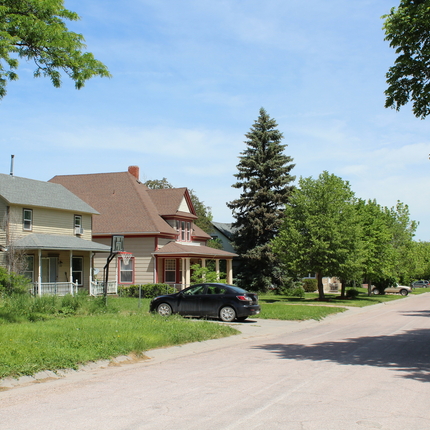The Center has long focused on strategies to support economic vitality for small communities. Our work to assist small businesses, develop value-added agriculture, and improve policy all focus on creating widespread opportunity for people who live in rural areas.
Increasingly, we see small town housing as an economic development issue. While adequate and affordable housing is a quality of life issue, it also plays an important role in economic development. A lack of local housing can undercut successful business start-up or business growth strategies.
Small towns often have less available housing stock than larger towns. The smaller the place, the larger the challenge. A shortage of appropriate housing leads to the loss of economic development opportunities.
When a business is growing in a small town, this growth may be constrained by workforce shortfalls because employees cannot find nearby housing. Or, if employees choose to live in a larger town and commute to the small town, the local economic development potential of business growth is diminished. In the most pernicious instances, business growth is curtailed or businesses relocate to or invest in expansion in larger communities where housing is a lesser issue.
Aging housing stock, misalignment between available housing and market needs, and affordability all have the potential to become a drag on small town economic vitality.
Understanding that housing and local economic vitality are linked can help focus local and state efforts on the housing challenges rural communities face. The solutions are multifaceted. Consider some options:
Local and nonprofit developers — For-profit developers often pass over small markets; they can make more money elsewhere. Encouraging developers who care not just about profit but also about the community is an important strategy. Local developers as well as nonprofit developers are more motivated to figure out strategies that work locally. What more can you do to encourage the emergence of these developers in your community?
Housing rehab — In our home region of the country, an aging housing stock is in need of tender loving care. Where the cost of new construction outpaces market values, existing home rehabilitation offers an alternative. Again, local developers as well as financing opportunities must be aligned for the strategy to work.
Engage local businesses — Local business leaders are often acutely aware of the impact of housing on their workforce. We see businesses in rural Nebraska getting involved in housing development. A systematic approach to engaging business leaders and economic developers in housing can unlock new resources. Are business leaders engaged in housing in your community?
In addition to these ideas, financing for both developers and individuals, innovative approaches to materials, multifamily housing, smaller square foot options, increased direct government investment, and changes in public policy all offer promise.
For local economic development to succeed, communities need housing stock that is adequate for market expectations and affordable to local residents.





